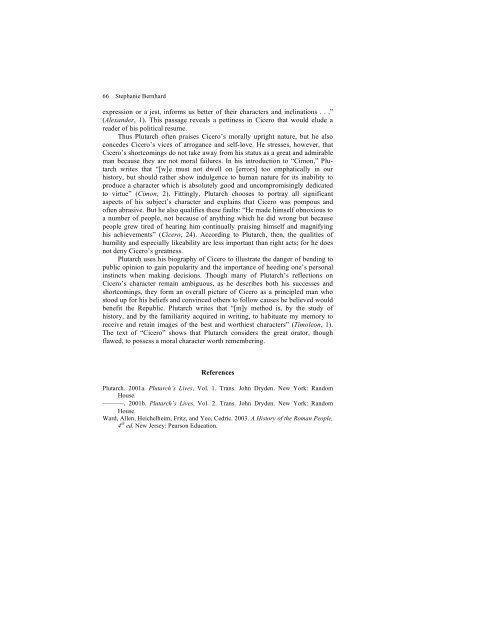Create successful ePaper yourself
Turn your PDF publications into a flip-book with our unique Google optimized e-Paper software.
66 Stephanie Bernhard<br />
expression or a jest, informs us better of their characters and inclinations . . .”<br />
(Alexander, 1). This passage reveals a pettiness in Cicero that would elude a<br />
reader of his political resume.<br />
Thus Plutarch often praises Cicero’s morally upright nature, but he also<br />
concedes Cicero’s vices of arrogance and self-love. He stresses, however, that<br />
Cicero’s shortcomings do not take away from his status as a great and admirable<br />
man because they are not moral failures. In his introduction to “Cimon,” Plutarch<br />
writes that “[w]e must not dwell on [errors] too emphatically in our<br />
history, but should rather show indulgence to human nature for its inability to<br />
produce a character which is absolutely good and uncompromisingly dedicated<br />
to virtue” (Cimon, 2). Fittingly, Plutarch chooses to portray all significant<br />
aspects of his subject’s character and explains that Cicero was pompous and<br />
often abrasive. But he also qualifies these faults: “He made himself obnoxious to<br />
a number of people, not because of anything which he did wrong but because<br />
people grew tired of hearing him continually praising himself and magnifying<br />
his achievements” (Cicero, 24). According to Plutarch, then, the qualities of<br />
humility and especially likeability are less important than right acts; for he does<br />
not deny Cicero’s greatness.<br />
Plutarch uses his biography of Cicero to illustrate the danger of bending to<br />
public opinion to gain popularity and the importance of heeding one’s personal<br />
instincts when making decisions. Though many of Plutarch’s reflections on<br />
Cicero’s character remain ambiguous, as he describes both his successes and<br />
shortcomings, they form an overall picture of Cicero as a principled man who<br />
stood up for his beliefs and convinced others to follow causes he believed would<br />
benefit the Republic. Plutarch writes that “[m]y method is, by the study of<br />
history, and by the familiarity acquired in writing, to habituate my memory to<br />
receive and retain images of the best and worthiest characters” (Timoleon, 1).<br />
The text of “Cicero” shows that Plutarch considers the great orator, though<br />
flawed, to possess a moral character worth remembering.<br />
References<br />
Plutarch. 2001a. Plutarch’s Lives, Vol. 1. Trans. John Dryden. New York: Random<br />
House.<br />
———. 2001b. Plutarch’s Lives, Vol. 2. Trans. John Dryden. New York: Random<br />
House.<br />
Ward, Allen, Heichelheim, Fritz, and Yeo, Cedric. 2003. A History of the Roman People,<br />
4 th ed. New Jersey: Pearson Education.

















